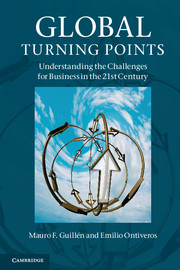Book contents
- Frontmatter
- Contents
- Illustrations
- Tables
- Preface
- 1 Welcome to the twenty-first century
- 2 A global economy out of balance
- 3 The rise of the emerging-market multinationals
- 4 The new demography
- 5 From dictatorship to democracy and failed states
- 6 A disparate world
- 7 The quest for sustainability
- 8 The global powers of the twenty-first century
- 9 Coping with uncertainty and complexity
- References
- Index
8 - The global powers of the twenty-first century
- Frontmatter
- Contents
- Illustrations
- Tables
- Preface
- 1 Welcome to the twenty-first century
- 2 A global economy out of balance
- 3 The rise of the emerging-market multinationals
- 4 The new demography
- 5 From dictatorship to democracy and failed states
- 6 A disparate world
- 7 The quest for sustainability
- 8 The global powers of the twenty-first century
- 9 Coping with uncertainty and complexity
- References
- Index
Summary
KEY TURNING POINTS
During most of the twenty-first century India will be the biggest country in terms of population, China the largest in output, and the United States the richest among the major economies on a per capita income basis.
Perhaps the most tantalizing question about the twenty-first century has to do with the identity of the dominant global power, or whether there will be one at all. If the United Kingdom reigned supreme during much of the nineteenth century and the United States dominated the second half of the twentieth, are we to assume that a different global power will emerge during the twenty-first? For some, the answer is obvious and it points to China (e.g., Jacques 2009; Subramanian 2011). For others, the United States will hold its sway, albeit with a severely diminished capacity to act unilaterally (Nye 1990, 2010). For a third group of observers and commentators, including cold-warriors like Henry Kissinger, the twenty-first century will be characterized by an uneasy balance among several global powers (Bremmer 2010a; CSM 1989; Kissinger 2011). It is clear that “we are now at the start of what may become the most dramatic change in the international order in several centuries, the biggest shift since European nations were first shuffled into a sovereign order by the Peace of Westphalia in 1648” (Ramo 2009: 7–8).
Information
- Type
- Chapter
- Information
- Global Turning PointsUnderstanding the Challenges for Business in the 21st Century, pp. 121 - 148Publisher: Cambridge University PressPrint publication year: 2012
